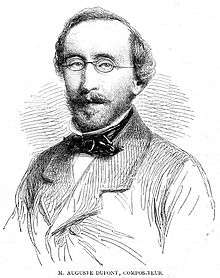Auguste Dupont
Auguste Dupont, full name Pierre-Auguste Dupont, (9 February 1827 - 17 December 1890) was a Belgian pianist and composer.[1]
Auguste Dupont | |
|---|---|
 Auguste Dupont (L'Illustration, 1862) | |
| Born | 9 February 1827 |
| Died | 17 December 1890 (aged 63) |
| Occupation | Pianist, composer |
A laureate of the Royal Conservatory of Liège, where he was a student of Jules Jalheau, he travelled for a time as a musician in Germany, England and the Netherlands. While performing in Berlin, he was introduced to Giacomo Meyerbeer who gave him work for a time and who often mentions him in his diary.[2] In 1850, he became a professor at the Royal Conservatory of Brussels. He composed several major pieces for concerts and pieces of chamber music.[3] He was also the editor of the series École de piano du Conservatoire de Bruxelles, forty booklets of classical masterpieces.[4] He became a teacher of chamber music in 1886.[5]
His brother was the violinist and composer Joseph Dupont.
Works
- Pluie de mai, Étude de trilles pour piano (Op.2) [6]
- Grande Capriccio sur Robert le Diable [7]
- Le Staccato Perpétuel (Op.31) [8]
- Grande galop fantastique [8]
- Contes du foyer (Op. 12) [9]
- The Tickalicktoo Polka, Dedicated to the Esquimaux Family, Who Appeared Before Her Majesty at Windsor Castle, Feb. 3, 1854 [10]
- Morgane [11]
- Suite en quintette [12]
- Intermezzo - barcarolle [13]
- Tocatelle pour piano (Op. 26) [14]
- Chanson hongroise (Op. 27) [15]
- Berceuse en la mineur pour piano (Op. 35)
- Trois Danses dans le style ancien (Op.37) [16]
- Fantasie et Fugue (for the right hand)(Op.41) [17]
- Roman en dix pages (Op. 48) [9]
- Piano Concerto in F minor (Op. 49) [15]
- La Pensée [18]
- Morceaux Caractéristiques [18]
- Feuille d'album : duettino pour piano et harpe ou 2 pianos (Op. 58)[19]
- Valse expressive pour piano (Op. 60)
In 1862, L'Illustration p. 197, mentioned the following works:[20]
- Poème d'amour, Sept chants lyriques [op. 54]
- Reminiscences Pastorales
- Rêveries sur l'eau
- Trio en sol mineur pour piano, violon et violoncelle (Op. 33)
- Grand quatuor
- Sonate
- Marche druïdique
- Une Chanson de jeune fille (Op.18)
- Chanson du feu
- Danse des ombres
- Danse des Almées
Honours
- Chevalier de l'Ordre du Lion (1856).[21]
References
- Site Bach Cantatas
- The Diaries of Giacomo Meyerbeer: The years of celebrity, 1850-1856, Fairleigh Dickinson Univ Press, 1 January 2002]
- L'Illustration, 1862 p. 197
- La série en ligne
- Robert Wangermée, François Joseph Fétis, Correspondance, Éditions Mardaga, 2006, p. 499
- 'The Diaries of Giacomo Meyerbeer, op.cit. p. 194
- Caecilia: algemeen muzikaal tijdschrift van Nederland, 13e année, nr 9, 1 May 1856, p. 194
- Caecilia 1856, op.cit. p. 194
- Site Bach Cantatas, op.cit.
- nunatsiaqonline.ca
- en ligne
- en ligne
- muziekweb.nl
- en ligne
- en ligne
- en ligne
- Site pianoeducation.org
- Auguste Dupont sur le site Grande Musica
- site classify.oclc.org
- en ligne
- Caecilia: algemeen muzikaal tijdschrift van Nederland, 14th year, 1 January 1857, p. 12